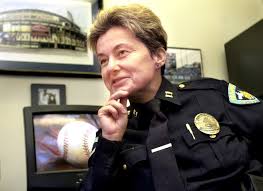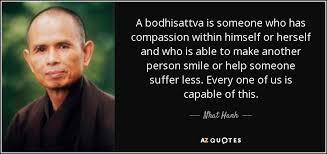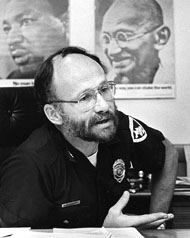“When you’re a police officer and you do this work, you need to find a way to be able to maintain both the compassionate bodhisattva within you and the fierce bodhisattva and know when each is called for and how to combine the two. And once you start down this path, it’s possible to learn that…” Police Capt. Cheri Maples
“Who else would we want to carry a gun except somebody who will do it mindfully?” Sr. Chan Kong to Cheri Maples

It’s been almost a year now since Cheri died and two years since her tragic bicycle accident which left her paralyzed and led to her early death a year later.
Cheri was a woman I loved. We forged our relationship when I asked her to come and work with me when I was Chief of Police in Madison. Cheri was a young, gay woman who, at the time I hired her in 1984, was working on her PhD in Social Work. She and I argued and challenged each other — and from that challenge came great creativity and forward-progress in our department. (You can read more about her and her many accomplishments HERE.)
I have been thinking about her because she was gutsy and courageous. We carried on our relationship even after our retirements. I went into the Christian clergy as an Episcopal priest and Cheri became an ordained dharma teacher in the tradition of the Vietnamese monk, Thich Nhat Hanh. We both saw our spiritual quest as a necessary part of our life’s journey. I am enclosing her interview with Krista Tippett in July, 2016 shortly before her accident.
This interview captures the important role of developing “mindfulness” as an essential aspect of a police officer’s emotional health. In the Buddhist tradition, one can become a “bodhisattva;” that is, being a person who has reached enlightenment yet chooses to stay on earth to serve others and the importance of always keeping our hearts “open and soft.”
ON BEING
With Krista Tippett
MS. TIPPETT: I’m Krista Tippett, and this is On Being. Today, with a radio pilgrimage with Thich Nhat Hanh, exploring his practice of mindfulness in a world of violence. We’re at a retreat center in eastern Wisconsin. For the first time at such a gathering, more than 50 people who work in the criminal justice system are here, about half of them police officers.
A police captain from Madison, Wisconsin, Cheri Maples, helped make this possible. She first encountered Thich Nhat Hanh’s teachings in the early ’90s and wondered if she could incorporate such ideas into police work. He surprised her by insisting that there is such a thing as a fierce bodhisattva — bodhisattva in Buddhist tradition being a person who has reached enlightenment and chooses to stay on Earth to serve others. Now Cheri Maples calls Thich Nhat Hanh “Thay” or teacher. But on her first retreat with him, as a person who carries a gun for a living, she balked at his most basic principles.
MS. MAPLES: Well, as a cop, what started to happen to me there got very interesting because — I don’t know if you attended the five mindfulness trainings, but that was one of the things that happened at my first retreat. And I just assumed, “Well, I’d listen to this, but I can’t do that. I’m a cop. I mean, I might be in a position where I have to kill somebody at some point. I can’t think about taking these.” And Sister Chan Khong, who is one of the — probably the senior monastic here, was at that retreat, and she pulled me aside and she had this very wonderful conversation with me, the essence of it being, “Who else would we want to carry a gun except somebody who will do it mindfully? Of course you can take these trainings.”
MS. MAPLES: And what happened to me is my heart started to soften and kind of break open for the first time. I had gotten very mechanical about how I was doing my job. I had no idea that I had shut down that way. And I came home and, especially that first week when it was so new and everything felt so fresh, I started to understand that, on a very, very deep level, that it’s possible to bring this into your work as a cop because, as my energy started to change, the energy that I got back from other people started to change, even including the people that I had to arrest and take to jail.
But probably the first example of that was — I was on a domestic violence call, and it was one of these calls where I would have just arrested the guy. I would have just — “Hey, enough’s enough,” you know? This was a scenario where breaking up is hard to do, and there was a little girl, and they were exchanging custody. And he was kind of holding the little girl hostage, not wanting to give her back to Mom. And there had been no violence that had taken place, but both Mom and the little girl were very scared and intimidated.
And ordinarily I would have said, “That’s it,” slapped the handcuffs on him, taken him to jail. But something stopped me, and it was I had just come out of this retreat. And I got the little girl, got him to give me the little girl, took care of her, got her and her mom set, told them just to leave, went back. And I just talked to this guy from my heart, and within five minutes — I mean, I’ve got this big gun belt on. I’m about 5’3″. Right? And this guy’s like 6’6″. And he’s bawling. And I’m holding this guy with this big gun belt on and everything. And he was just in incredible pain, and that’s what I started realizing we deal with is misplaced anger because people are in incredible pain.
So I ran into him three days later in a little store on Willy Street, where I lived at the time. And this guy comes — he sees me off-duty, he picks me up, gives me this big bear hug, and said, “You saved my life that night. Thank you.” And so when you have experiences like that, and you start to realize, “Well, what am I doing different here?” I mean, really, it’s about softening your heart. When you’re a police officer and you do this work, you need to find a way to be able to maintain both the compassionate bodhisattva within you and the fierce bodhisattva and know when each is called for and how to combine the two. And once you start down this path, it’s possible to learn that.
MS. TIPPETT: Did you have a hand in making this retreat happen? Is that right?
MS. MAPLES: When I decided to take my practice further — in about 2000, I really got much more committed. And then I decided I wanted to become a member of the order, a core member of the order. And then I went out to Plum Village last year.
MS. TIPPETT: In France?
MS. MAPLES: In France for three weeks, which was probably one of the most wonderful three weeks of my entire life. You know, as a police officer, you’re so often a victim and so often an oppressor. You really have to come to grips with both of those. And I wrote a letter to Thay, because when you want to receive the mindfulness trainings, that’s one of the requirements. He got my letter, which talked a lot about sort of where I’m at with all this, and the next day gave this two-hour dharma talk on the different faces of love and why it’s possible to be a bodhisattva and carry a gun. It was just unbelievable to me.
I just started having this image while I was out there of my co-workers, other police officers, holding hands and making — doing walking meditation together and making peaceful steps on the Earth together. And I mentioned it during a working meditation with one of the people. She said, “You know, you can make that happen.” So by the end of the retreat, I got on the stage with Thay, and I asked him if he would do a retreat for police officers. And he said yes, and this is it.
MS. TIPPETT: And tell me what you are hearing or experiencing of the effect this is having on your colleagues.
MS. MAPLES: Well, at first, it was kind of a mini revolt because they really thought — it’s a very, very big thing having to face the possibility of having to kill somebody that you could face every day. They wanted to talk about that with each other. They wanted to talk about, “Why are we so critical of each other? Why is there so much stress in our workplaces? How can we apply some of these concepts?” And they also sometimes, if you’ve never been exposed to Thich Nhat Hanh and — I can translate the language for them, but some of them hear, “You can never, never fight violence with violence.”
And they’re saying to me, “Well, what the hell am I supposed to do when somebody’s beating the crap out of somebody? Am I supposed to stand there and watch them?” So some of it is literally a translation thing. But to watch them getting the sort of understanding and exposure that I had early on, just to see that there’s some richness and nourishment here. And what we talked about yesterday is my first Zen activity as a little girl was baseball because that was the first activity that I ever performed where I was so absorbed in it my total focus and concentration was there and nothing else was present.
MS. TIPPETT: And that’s a definition of Zen.
MS. MAPLES: That’s my definition of Zen. And so you have to, as a practitioner, find the ways to practice that resonate with you. And if you are faithful to your practice, your practice will be faithful to you. Police officers, as you can imagine, the major problem is we deal with being hypervigilant all the time, so we’re off the scale up here. You know, you’re looking around you all the time wondering where that next problem is coming from. And if you don’t have a way to come back down and find some ways to take care of yourself, you’re going to find ways to stay up there because it feels good in an odd sort of way, in dysfunctional ways.
MS. TIPPETT: You know, I asked Thay, “How is your teaching different when you’re speaking to these different kinds of groups?” And his answer was so interesting, that he has to come to understand the particular suffering of that group of people.
MS. MAPLES: It’s a special form, and Thay has really taken so much time to understand it. And where our suffering comes from is really two places. One, we deal with the 5 percent of the worst part of society, so you start — you don’t want your kids exposed to that. You don’t want your partner exposed to that. It’s got to go somewhere. You don’t know who to talk to about it, but it starts to affect the way you see people. That’s one thing.
And the accumulated stress of — if you’re a young officer and you go to your first accident scene where somebody’s head has been rolled over, you go to your first — you go to a homicide scene and you see very grisly details, you go to lots of different things that — one incident may not cause it, but the accumulated sort of stuff post-traumatic stress is made from, and you start shutting down and you don’t realize it. So you need tools to keep your heart open and soft.

Officer, what are you doing to make sure you are healthy, resilient, and keep your heart open and soft?


This is beautiful. >
LikeLiked by 1 person